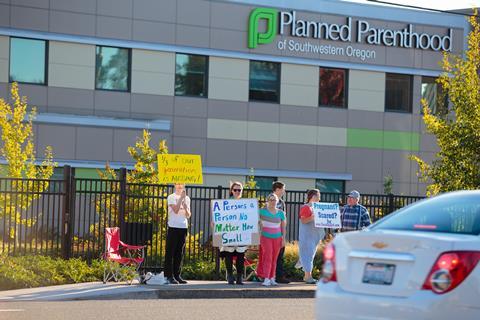Michelle Tant suggests that when it comes to abortion, ’Confronting women on the front line is too late and an upstream approach is vital if we are to make significant change to the statistics.’

The recent implementation of ‘safe zones’ around abortion clinics in England has been seen as a blow to pro-life campaigners, leaving some wondering how they can speak up for the unborn if this option for protest is removed.
The abortion debate can be polarising in ways that no other issue can manage, with both ends of the spectrum believing the other to have a callous disregard for life. This is an extremely complex issue but one that I, as both a midwifery lecturer and Christian feminist, believe can be approached with both grace and truth. Abortion is a matter of social justice and as with all issues of social justice; racism, misogyny and sex trafficking to name but a few, the way to be tackled is to consider the structures and systems which uphold them.
So why isn’t it as simple as a binary choice between pro-life and pro-choice?
So why isn’t it as simple as a binary choice between pro-life and pro-choice? The scriptures are clear, he knitted us together in our mothers’ wombs (Psalm 139:13) and even before we were formed, he knew us (Jeremiah 1:5). However, we also know that God is a stronghold for the oppressed (Psalm 9:9) and near to the broken-hearted (Psalm 34:18) so we may find ourselves as Christians paralysed between a knowledge of the sanctity of life and how to express compassion for those facing the possibility of abortion.
In the UK there are over 200,000 abortions yearly and this heart-breaking number represents women navigating a decision process for which there is no level playing field. Lack of education, poverty and familial instability are significant drivers and if a woman lives in a deprived area or experiences multiple indices of deprivation, then she is almost three times as likely to have an abortion.
Not enough is said about the men who are at least 50% responsible for every pregnancy. The term ‘at least’ used to reflect the fact that sex is not always consensual, a further layer of oppression that many women experience. When men are not raised to respect women or to take responsibility for the potential outcome of unprotected sex, the consequences are far-reaching. Abortion comes back to an issue of social justice and inequity of some kind in the underlying circumstance or structure in almost every case.
Understandably, people hear the abortion statistics and are moved with compassion for the loss of life of the unborn and this is undoubtedly a tragedy.
Understandably, people hear the abortion statistics and are moved with compassion for the loss of life of the unborn and this is undoubtedly a tragedy. It feels like it requires an immediate response, and it does, but not a response of condemnation, for the unborn are not the only ones at risk here. A woman might change her mind about having an abortion after seeing the images utilised by pro-life organisations, but the reasons she wanted or needed an abortion have not gone away, nor have the systemic issues which will continue to drive women to abortion.
Read more on abortion
Every time Jesus was confronted with a sinner, he ‘fronted’ love. He offered love, and repentance followed (Luke 19:1-10). Confronting women on the front line is too late and an upstream approach is vital if we are to make significant change to the statistics. Many churches may not be able to offer skilled pregnancy or abortion counselling and support, but all are able to offer compassion and community, and not condemnation for those in need. With careful planning, parental consent and training, churches could talk about godly sexuality to our children and youth to help counter the narratives they are hearing from school and their peers. Churches can also get involved in local and national social action to make meaningful difference on a systems level and of course, they can cry out in prayer about the injustices against vulnerable women and the unborn.
Abortion is a complex and heart-breaking issue involving multiple layers of injustice. But thankfully we have a God who instructs us to cast our cares on him and to pray without ceasing. He loves the unborn even more than we do and the compassion he has for those pushed into unthinkable decisions far exceeds our own. Grace and truth should unite the polarisation we are suffering within the church and society. Ultimately, pro-life and pro-choice want the same thing, abortion to become both unthinkable and unnecessary.
If any of these issues have affected you, you can call Premier Lifeline for support. Premier Lifeline is a national, confidential helpline offering a listening ear, emotional and spiritual support from a Christian perspective. If you would like someone to talk with and pray for you, call Premier Lifeline on 0300 111 0101.



































No comments yet